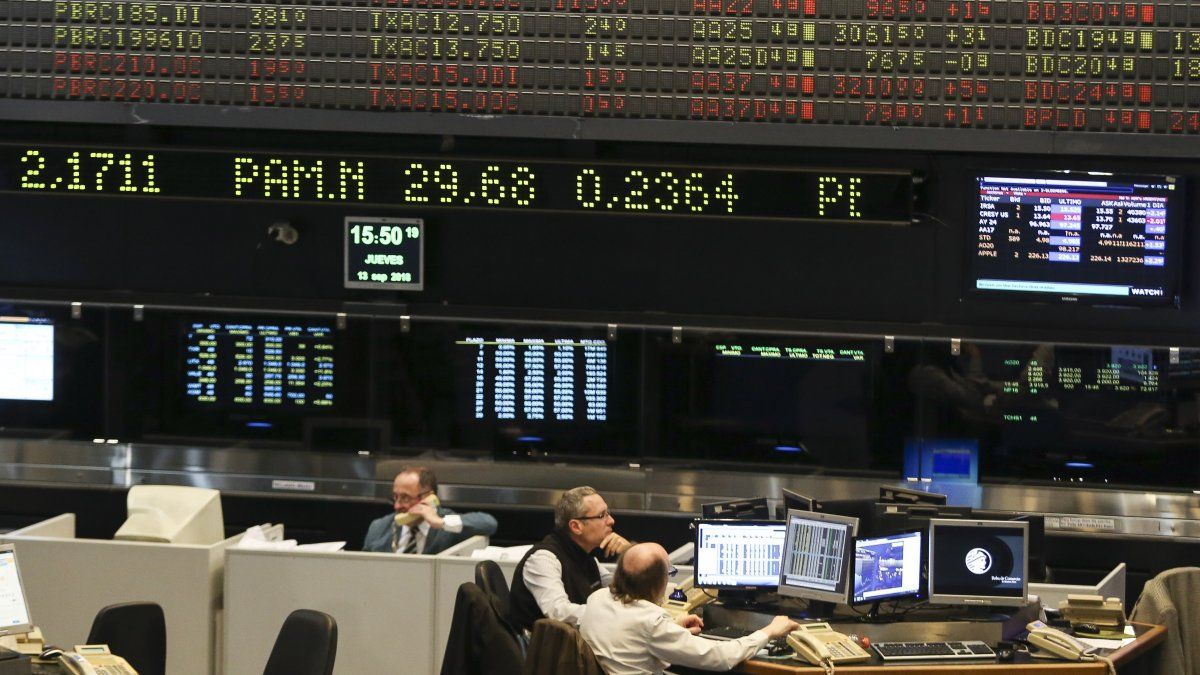But the city seems to have learned that in this election things will not go as they thought. In the first round, Milei appeared as a favorite but ended up in second place with a distance of 7 points compared to the ruling party embodied by Sergio Massa.
The cards are cast and although many avoided being “bought” into this close election, the most risky will choose to gamble at the last minute on Friday in the local variable income with values that, measured at dollarare extremely low for investors.
He S&P Merval It has been performing well so far this year with increases of up to 300% for some notable stocks. However, in recent days, the Buenos Aires stock market has not been able to take advantage of the external tailwind pressured by him local political landscape.
Delphos Investment, In a recent report, he gave a small account of how the market reacted in the PASO and in the first round. Let’s see:
When Javier Milei gave the surprise on August 13 in the PASO, most of the papers had weak performance during the following week, they point out. In this sense, the papers that benefit from a eventual devaluationas Ternium (TXAR), Aluar (ALUA) and Cresud (CRES), They achieved positive returns. This was basically due to the possibility that if the libertarian candidate wins he would carry out dollarization.
The most affected stocks were banks, due to exposure to monetary imbalances. Mirgor (MIRG) was the most affected by its connection with the tax benefits provided by the state.
In the first round which gave a more favorable outlook to Sergio Massa, The banks rose and Mirgor stood out above the other papers. The energetic such as YPF, Pampa Energía (PAMP) and Transportadora Gas del Sur (TGS) also fell, as a result of expectations that perpetuate the obstacles to a thriving sector.
According to Delphos, “the basic consumer and oil and gas sectors are the most defensive when facing the elections, followed by utilities and materials.” Meanwhile, discretionary consumption, banks and industrials are the most “aggressive” and with greater downward potential “but higher potential returns in a favorable scenario.”
In this framework, a recent report from 1816 highlights that for the fixed income in pesos and bank shares, the best scenario is Massa, given how disruptive the dollarization proposal is.
“For non-bank stocks, the market seems to prefer Milei, judging by what has happened in equities since August. After the PASO, when Milei became favorite, there was a rapid recovery after the initial reaction and a rally that took the S&P Merval almost to its highest levels in the last 4 years. After the first lap, when Massa was better positioned than expected, the variable income corrected and since then it had a poor performance in relation to comparable markets,” concluded 1816.
Stocks: which have the greatest upside potential after the runoff?
Marcelo Bastantestock market expert, spoke with Ambit and recalled that the Argentine stock market has “high volatility” Therefore “it is not recommended for conservative investors or those who want to preserve capital.”
Under this premise, he maintained that with the information available today, “it is understood that Massa’s objectives are more focused on the productive development, It is inferred that there will be no shock-type adjustments but rather it will be more gradual. In that sense, I think bank stocks would be better positioned, and sectors linked to construction or internal market, such as Loma Negra (LOMA) or Sociedad Comercial Del Plata (COME)”.
On the other hand, it is understood that under a Milei government there could be a initial shockwith increases in exchange rates and rates, and faster elimination of exchange restrictions. The companies benefiting under this scheme would be those linked to exports (Aluar, Ternium, YPF), utilities and energy companies due to the tariff recomposition (TGN TGS, Central Puerto, Edenor, etc.).
Markets.jpg
freepik
Tight election: what impact can be expected on equities?
The analyst Bastante maintained that from market theory, ““what is bad or negative is worse than what is uncertain.”. From this point, he suggests that it is very important as soon as the election is over that the winner begins to elucidate his economic plan.
“To correct existing imbalances, we must take measures that may sound unpopular, such as increasing taxes, adjusting spending (that is, the negative). But it is preferable that this begin to be announced quickly to remove uncertainty and that the market begins to digest it quickly. If the announcements are delayed, volatility will increase,” he explained.
Finally, when asked what would happen in the event that a situation similar to the one that occurred in La Plata occurred, regarding the “vote by vote” count as it was an election that was expected to be tight, Bastante maintained that although this option should be the least likely, would bring falls in the bond and stock markets.
However, he warned: “both Argentine bonds and stocks are at the bottom, They don’t have much more room to fall. In short, it is the panorama that exists these days, in which “There is no clear winner in sight.”
Source: Ambito
I am a 24-year-old writer and journalist who has been working in the news industry for the past two years. I write primarily about market news, so if you’re looking for insights into what’s going on in the stock market or economic indicators, you’ve come to the right place. I also dabble in writing articles on lifestyle trends and pop culture news.




